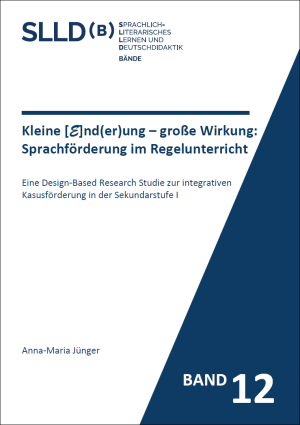Small change - big effect: language support in regular classes: A Design-Based Research Study on integrative case support in lower secondary education
Synopsis
Even for learners at lower secondary level, case marking can be a challenge. However, being able to mark case appropriately is of great relevance, since case marking is important for the production of unambiguous statements and text comprehension, among other things. Nevertheless, scientifically founded and empirically evaluated, integrative language support offers for the development of case inflection for the lower secondary level represent a desideratum. The overarching research question of this thesis is therefore: How can language support be integrated into the regular teaching of lower secondary school to support case inflection in learners of German as a second language with a late-successive type of language acquisition?
The design-based research approach was used to answer the research question, as a scientifically sound concept does not guarantee that the design will work in and for school practice. In a first step, a first prototype of the language support concept called FLEX and design assumptions for language support measures integrated into regular lessons were developed on the basis of findings from various research disciplines (linguistics, second language acquisition research, psycholinguistics, language and foreign language didactics). These were then empirically analyzed in a total of seven sub-studies with a total of 35 test subjects and with the inclusion of a total of 426 written products (e.g. exercise book entries or support tasks). The focus was particularly on the cognitions of the learners, the practicability for teaching practice and the effectiveness of the design.
On the theoretical side, the results of this work consist of professionally and empirically founded, context-sensitive design principles for the conceptualization of integrative language support measures to expand case inflection in non-grammar school secondary education, which go beyond didactic recommendations. According to these principles, integrative language support should be differentiated according to language level, analogous to acquisition progression and continuous. The support procedure should be appropriate and effective for the type of support, the target group and the subject matter. In terms of educational practice, the result is the FLEX language support concept for the development of case inflection in German as a second language learners with a late-successive language acquisition type at lower secondary level. Due to the scientifically sound conception, repeated empirical implementation and cyclical further development of the design, it can be assumed that FLEX can be implemented in practice in an adherent manner. In the course of support using FLEX, the learners' language level in the area of case marking is first determined by means of a language level assessment. Support is provided during lessons either on written documents produced in regular lessons or on support tasks that are used in the classroom. Whenever learners produce a case error that corresponds to their language level, they receive written, focused, meta-linguistic-indirect, corrective feedback.

Downloads
Published
Series
License

This work is licensed under a Creative Commons Attribution-ShareAlike 4.0 International License.

